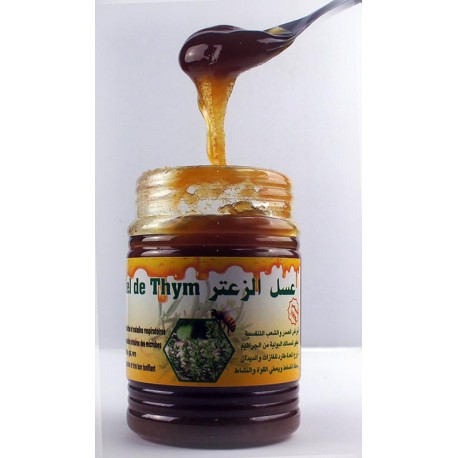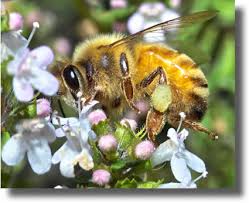- On sale!
- -20%










Our Thyme honey is produced in the Moroccan mountains, our moroccan thyme honey is highly recommended for patients suffering of duodenal and gastric ulcers.
Moroccan Thyme honey is one great product with many health benefits.
Net weight : 250 g
 Secure payment
Secure payment
You can pay securely
 Quick delivery
Quick delivery
We deliver your order directly after receipt of payment
 Satisfied or refunded
Satisfied or refunded
If you are not completely satisfied with your purchase, simply return for refund
Thyme is a member of the nectar-producing mint family, Lamiaceae, the source of other flavorful honeys such as mint, sage, oregano, and lavender.
It is best cultivated in a hot, sunny location with well-drained soil. It is generally planted in the spring, and thereafter grows as a perennial. It can be propagated by seed, cuttings, or by dividing rooted sections of the plant. It tolerates drought well. The plants can take deep freezes and are found growing wild on mountain highlands.
Thyme belongs to the genus Thymus, which contains about 350 species of aromatic perennial herbaceous plants and subshrubs. Among them: Thymus citriodorus: various lemon thymes, orange thymes, lime thyme; Thymus herba-barona (caraway thyme), used both as a culinary herb and a ground cover, and has a very strong caraway scent due to the chemical carvone; Thymus praecox (mother of thyme, wild thyme), cultivated as an ornamental; Thymus pseudolanuginosus (woolly thyme) which is not a culinary herb, but is grown as a ground cover.

It is logical that honey is healthy. It is pure and natural, contains enzymes and inhibits bacteria in some circumstances. However, thyme honey is special because of it’s powerful antioxdant properties. The type of antioxidants found in thyme honey have been labelled “defensive antioxidants” by the father of New Zealand honey research, Prof. Peter Nolan. These antioxidants can bind damaging oxidants that form, stopping them turning to free radicals and causing cell damage. Professor Nolans’ research has suggested that some of the highest rating food for supplying defensive antioxidants is thyme honey.
A Greek study that was published in the peer-reviewed journal “Food Chemistry” (vol 116 issue 3) found that thyme reduced the viability of Ishikawa (endometrial) cancer cells and PC-3 (prostate) cancer cells in vitro. The authors suggest that a diet enriched with thyme honey “may prevent cancer-related processes in breast, prostate and endometrial cancer cells” (Tsiapara, Jaakkola, Chinou et al Food Chemistry 116.3 2009).
Wildpure Certified Organic thyme honey is extracted from the honey frames at temperatures less than 37ºC (less than 99ºF). This is in line with the organic standard. The reason for this low temperature during honey extraction is to keep alive all the naturally occurring enzymes in the honey. This ensures we have truly raw and natural honey. Honey that has been heated above 45ºC (113ºF) rapidly starts to become degraded, as the enzymes become denatured and other chemical reactions cause the production of toxins (HMF). That is why it is important to source “raw” honey that preserves the health giving properties of that particular honey type.It is logical that honey is healthy. It is pure and natural, contains enzymes and inhibits bacteria in some circumstances. However, thyme honey is special because of it’s powerful antioxdant properties. The type of antioxidants found in thyme honey have been labelled “defensive antioxidants” by the father of New Zealand honey research, Prof. Peter Nolan. These antioxidants can bind damaging oxidants that form, stopping them turning to free radicals and causing cell damage. Professor Nolans’ research has suggested that some of the highest rating food for supplying defensive antioxidants is thyme honey.
A Greek study that was published in the peer-reviewed journal “Food Chemistry” (vol 116 issue 3) found that thyme reduced the viability of Ishikawa (endometrial) cancer cells and PC-3 (prostate) cancer cells in vitro. The authors suggest that a diet enriched with thyme honey “may prevent cancer-related processes in breast, prostate and endometrial cancer cells” (Tsiapara, Jaakkola, Chinou et al Food Chemistry 116.3 2009).
Wildpure Certified Organic thyme honey is extracted from the honey frames at temperatures less than 37ºC (less than 99ºF). This is in line with the organic standard. The reason for this low temperature during honey extraction is to keep alive all the naturally occurring enzymes in the honey. This ensures we have truly raw and natural honey. Honey that has been heated above 45ºC (113ºF) rapidly starts to become degraded, as the enzymes become denatured and other chemical reactions cause the production of toxins (HMF). That is why it is important to source “raw” honey that preserves the health giving properties of that particular honey type.
General characteristics of thyme honey:
– The honey is produced between the second half of June and the first half of July.
-The color of thyme honey is light amber to amber when liquid, beige to brown when it is crystallized.
-it is a very strong, intensely aromatic honey with resinous, herbal, savory flavors; fresh and reminiscent of tropical fruits, dates and white pepper.
– The taste is persistent, lingering in the mouth.
– It crystallizes spontaneously in a short time into medium or fine grains.
– It has an intense and complex aroma, which has been described as; floral, spicy, dried flowers, magnolia flowers, cedar, herbs, flowers, rubbed, clove, burnt plastic, pencil drawing, mulled wine, and Marsala.
– The flavor has been described as: salty, thymol, pharmacy, plastic, pencil, dates and pepper.
Unifloral thyme honey presents quite high values of díastase, high values of proline, fructose and acidity (causing a quick increase in HMF); the specific rotation has the lowest values.
Benefits and virtues:
Thanks to its high concentration of sugars, its richness in díastases and aromatic essences, honey has some antiseptic power: he was particularly opposed to any intestinal fermentation. It also contains a rare antibiotic factor, which is the focal point for its antimicrobial activity.
Directions for use:
One teaspoon three times a day
Composition of honey